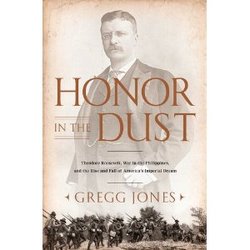Source of book image: http://www.chinarhyming.com/wp-content/uploads/2012/01/51Hr-aIgESL._SL500_AA300_.jpg
Marxists and others on the left often claim that big business is the main force behind U.S. imperialism. Is it not ironic that the most imperialistic U.S. President was the anti-big-business “progressive” Teddy Roosevelt who was vehemently opposed by big businessman Andrew Carnegie?
Mark Twain is sometimes accused of insufficient sympathy with the downtrodden. Those who so accuse, misunderstand his message. He too opposed Roosevelt’s war on the Filipinos.
(Carnegie and Twain’s friendship is discussed in David Nasaw’s biography of Carnegie.)
(p. 13) There was within the United States a strong and vocal anti-imperialist movement, which included former President Grover Cleveland, Andrew Carnegie and Mark Twain, but it struggled to tamp down the country’s growing expansionist zeal, and to compete with the energy, tenacity and bulldog ambition of one man in particular: Theodore Roosevelt. Roosevelt, who in just six years rose meteorically from New York City police commissioner to president, nurtured a deep and unshakable contempt for what he called the “unintelligent, cowardly chatter for ‘peace at any price.’ ” Not only had the “clamor of the peace faction” left him unmoved, Roosevelt wrote, it had served to strengthen his conviction that “this country needs a war.”
. . .
Although Roosevelt moves in and out of Jones’s narrative, disappearing for long stretches, he still manages to steal the spotlight, just as he does in every book in which he appears. When McKinley dragged his feet before sending troops to Cuba, Roosevelt sneered that the president had “no more backbone than a chocolate éclair.” In the Department of the Navy, Roosevelt gleefully took over while his boss was on summer vacation, anointing himself the “hot weather secretary” and crowing to a friend that he was having “immense fun running the Navy.” In Cuba, after choosing his regiment of Rough Riders from 23,000 applicants, he ordered his famous charge up Kettle Hill wearing a custom-made fawn-colored Brooks Brothers uniform with canary-yellow trim.
For the full review, see:
CANDICE MILLARD. “Looking for a Fight; At the Turn of the 20th Century, Theodore Roosevelt Set Out to Transform the United States into a Major World Power.” The New York Times Book Review (Sun., February 19, 2012): 13.
(Note: ellipsis added.)
(Note: the online version of the article is dated February 17, 2012 and has the title “Looking for a Fight; A New History of the Philippine-American War.”)
The book under review is:
Jones, Gregg. Honor in the Dust: Theodore Roosevelt, War in the Philippines, and the Rise and Fall of America’s Imperial Dream. New York: New American Library, 2012.
The Nasaw book on Carnegie mentioned in my initial comments is:
Nasaw, David. Andrew Carnegie. New York: Penguin Press, 2006.
(Note: the pagination of the hardback and paperback editions of Nasaw’s book are the same.)

